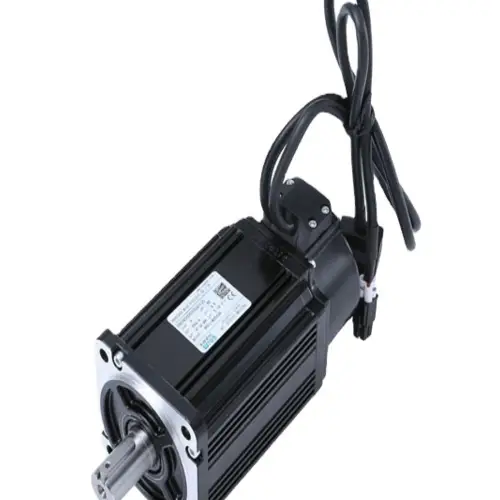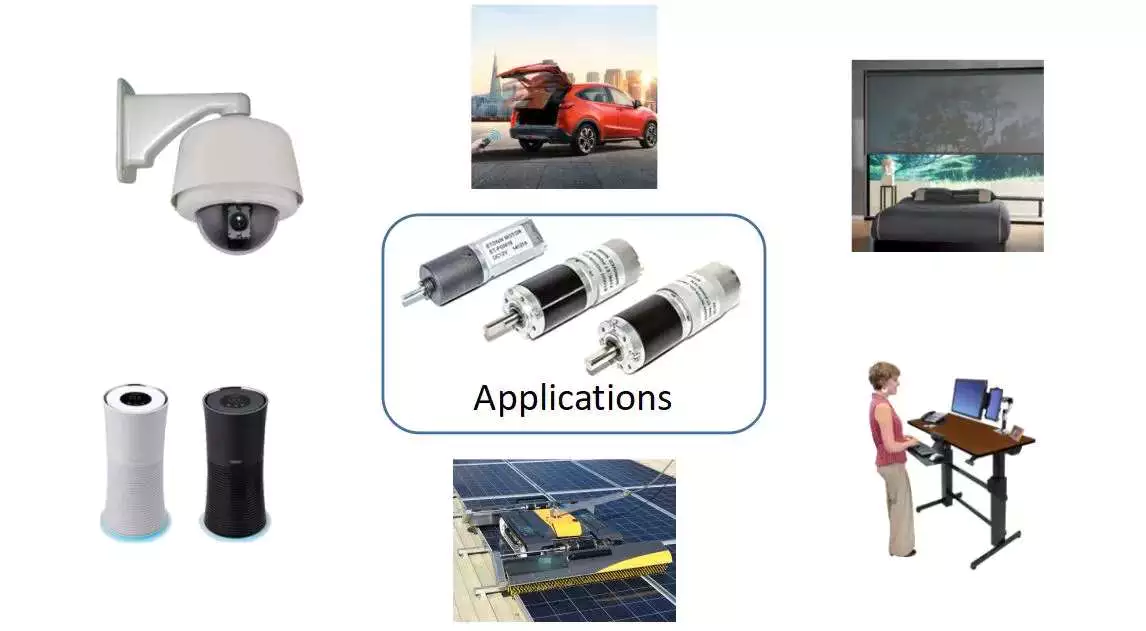
High Performance 80series 750W Servo Motors with 2500PPR Encoder for Sale
Product Description
If you are looking for a reliable and high-quality servo motor, our 80series 750W servo motors with 2500PPR encoder are the perfect solution. These motors are designed for a wide range of industrial applications, including CNC routers, engraving machines, laser machines, and more. With a rated power of 0.75 kW, rated voltage of 220V, and rated speed of 3000 RPM, these servo motors provide exceptional performance and accuracy.
| Motor model | 80ST-M57130 |
| Rated power(kW) | 0.75 |
| Rated voltage(V) | 220 |
| Rated current(A) | 3 |
| Rated speed(RPM) | 3000 |
| Rated torque(N.m) | 2.4 |
| Peak torque(N.m) | 7.1 |
| Voltage constant(V/krpm) | 48 |
| Torque coefficient(N.m/A) | 0.8 |
| Rotor inertia(kg.m²) | 1.82*10-4 |
| Line-line resistance(Ω) | 2.88 |
| Line-line inductance(mH) | 6.4 |
| Electrical time constant(MS) | 2.22 |
| Weight(kg) | 1.78 |
| Encoder line number(PPR) | 2500 |
| Insulation class | Class F |
| Safety Class | IP65 |
| The operating of Environmental conditions | -20°C —-+40°C, below 90%RH No dewing |
These servo motors are easy to install and come with a 12-month warranty. Our company provides life-long technical service and after-sale service, ensuring that you are satisfied with your purchase. Contact us today to learn more about our 80series 750W servo motors with 2500PPR encoder.
Application
Our 80series 750W servo motors with 2500PPR encoder can be used in a wide range of industrial applications, including:
- CNC routers
- CNC milling machines
- Engraving machines
- Packaging machines
- Filling machines
- Cutting machines
- Printing machines
- Laser machines
- Carving machines
- Labeling machines
- Textile machines
Frequently Asked Questions
Q1. What is the rated power of the 80series 750W servo motors with 2500PPR encoder?
A: The rated power is 0.75 kW.
Q2. What is the encoder line number of the 80series 750W servo motors with 2500PPR encoder?
A: The encoder line number is 2500.
Q3. What is the weight of the 80series 750W servo motors with 2500PPR encoder?
A: The weight is 1.78 kg.
Q4. What is the lead time for the 80series 750W servo motors with 2500PPR encoder?
A: For standard samples, the lead time is 2-5 days. For mass production, the lead time depends on the quantities you need.
Q5. What other industrial products does your company supply?
A: Our company mainly supplies various industrial products, including agricultural gearboxes, power output shafts, sprockets, hydraulic couplings, worm gear reducers, racks, roller chains, pulleys, planetary gearboxes, timing pulleys, bushings, and more. Customers are welcome to customize products with drawings and samples.

Performance Characteristics of Servo Motor
– High Precision: Servo motors offer precise control and positioning, ensuring accurate movements in various applications.
– Fast Response: Servo motors have quick response times, allowing for rapid adjustments and precise positioning.
– High Torque: Servo motors can generate high torque output, enabling them to handle heavy loads with ease.
– Wide Speed Range: Servo motors can operate at varying speeds, making them suitable for applications that require different speed levels.
– Excellent Stability: Servo motors provide stable performance, maintaining position accuracy even in dynamic operating conditions.
– Smooth Operation: Servo motors offer smooth and precise motion control, reducing vibrations and ensuring smooth operation.
Types and Characteristics of Servo Motor
There are various types of servo motors available, each with its own unique characteristics:
– AC Servo Motors: AC servo motors are known for their high torque and excellent speed control.
– DC Servo Motors: DC servo motors are compact and offer quick response times, making them suitable for applications with limited space.
– Brushless Servo Motors: Brushless servo motors eliminate the need for brushes, resulting in low maintenance and longer lifespan.
– Linear Servo Motors: Linear servo motors provide linear motion, making them ideal for applications that require precise positioning along a straight path.
– Hybrid Servo Motors: Hybrid servo motors combine the benefits of stepper motors and servo motors, offering improved performance and control.
Advantages of Servo Motor Made of Different Materials
– Servo Motors with Aluminum Housing: Aluminum servo motors are lightweight, durable, and have excellent heat dissipation properties.
– Servo Motors with Stainless Steel Housing: Stainless steel servo motors are corrosion-resistant, making them suitable for harsh environments.
– Servo Motors with Plastic Housing: Plastic servo motors are cost-effective and lightweight, making them ideal for applications with weight restrictions.

Application of Servo Motor
Servo motors find extensive use in various industries:
– Industrial Automation: Servo motors play a crucial role in industrial automation systems, providing precise control and motion.
– Aerospace: Servo motors are employed in aerospace applications for their reliability and precise positioning capabilities.
– Automotive: Servo motors are used in automotive systems for applications such as power steering, throttle control, and braking systems.
– Medical Equipment: Servo motors are utilized in medical equipment for precise movements, such as robotic surgery systems and patient positioning.
– Consumer Electronics: Servo motors are found in consumer electronics devices, including cameras, drones, and home automation systems, for accurate control and positioning.
Future Development Trends and Opportunities
The servo motor industry is expected to witness the following trends and opportunities:
– Increased Demand for Miniature Servo Motors: As technology advances, the demand for smaller and more precise servo motors will rise.
– Growing Application in Robotics: With the increasing use of robotics in various industries, servo motors will play a vital role in robotic motion control.
– Integration with IoT: Servo motors integrated with IoT technology will enable remote monitoring and control, enhancing efficiency and productivity.
– Energy Efficiency: Future servo motors will focus on energy efficiency, reducing power consumption without compromising performance.
– Advancements in Control Algorithms: Improved control algorithms will lead to enhanced motion control and better performance of servo motors.
Choosing a Suitable Servo Motor
When selecting a servo motor, consider the following aspects:
– Power Requirements: Determine the power input and voltage requirements based on your application.
– Speed: Assess the required speed range and select a servo motor that can operate within that range.
– Torque: Consider the load requirements and choose a servo motor with sufficient torque output.
– Efficiency: Opt for a servo motor with high energy efficiency to minimize power consumption.
– Operating Environment: Evaluate the environmental conditions, such as temperature and humidity, and select a servo motor that can withstand them.
– Motor Type: Choose the appropriate type of servo motor based on your specific application requirements.
In conclusion, servo motors offer precise control, fast response, and high torque for various applications. Understanding their performance characteristics, types, and advantages in different materials is essential for selecting the right servo motor. Their widespread application in industries like industrial automation, aerospace, automotive, medical equipment, and consumer electronics highlights their significance. With the future trends and opportunities, servo motors are poised to continue playing a crucial role in the field of automation and robotics. Consider the power requirements, speed, torque, efficiency, operating environment, and motor type when choosing a suitable servo motor for your application.
Author: Dream